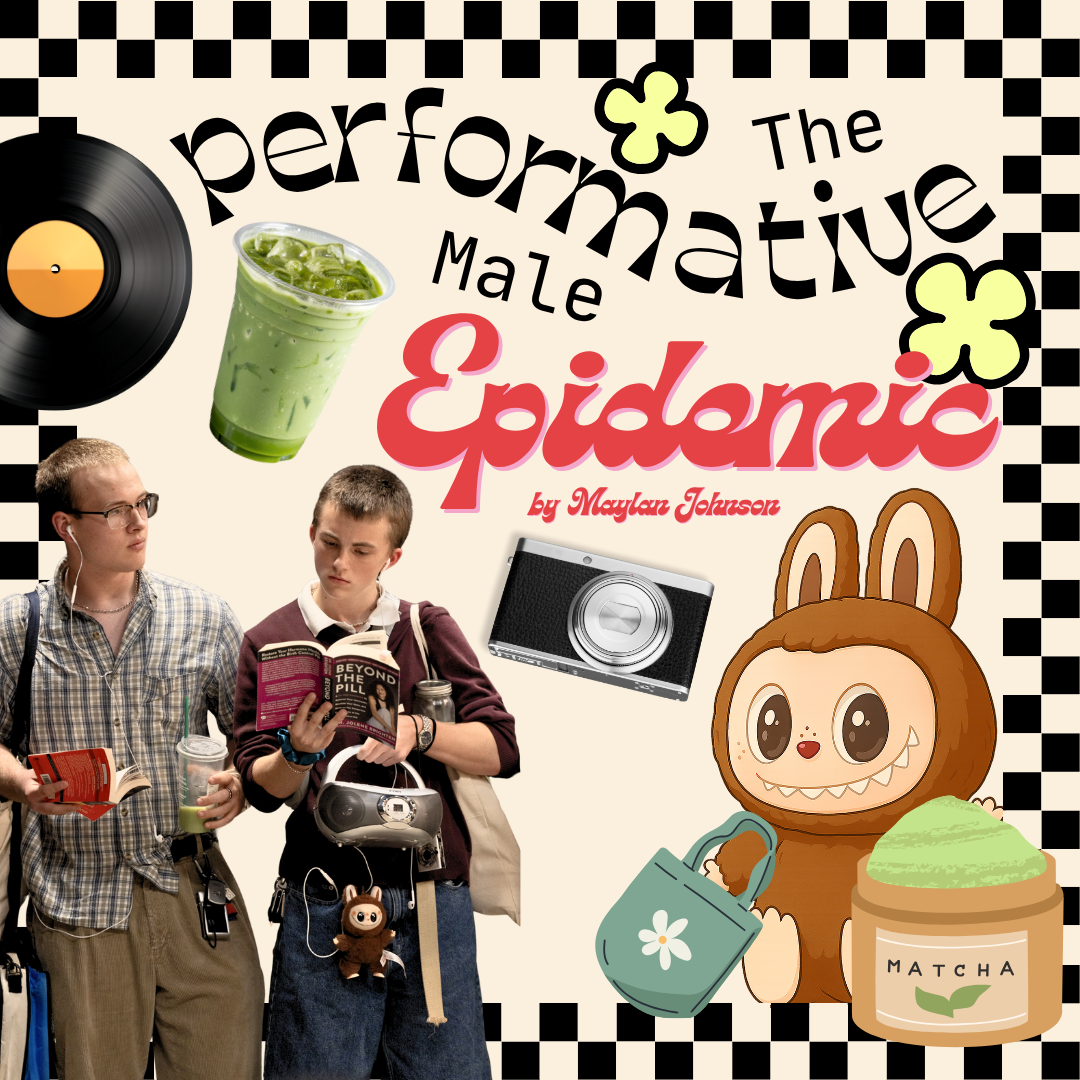As you enter your local coffee shop late in the afternoon with plans for a hefty study session in the books, you can’t help but notice a collection of young men gathered at the corner of the cafe. An array of baggy jeans and jorts complemented by cropped graphic tees and button-up shirts, their outfits seem almost effortlessly coordinated. As you continue to stare, you notice a common theme in accessories throughout each: a tote bag over their shoulder, wired earbuds draped around their neck, a matcha latte in hand, and digital cameras hung from carabiners along their waists. A pile of furry-looking creatures sits alone on a coffee table, deserted by their owners. You overhear a conversation between two of the young men; words like Clairo, feminine aura, and “Labubu” float through the air. Each of them appears to be reading intense novels; perhaps this is a book club? But wait… they are flipping through the pages too quickly to actually take in the content of the book; no, my friend, this is no book club. You have stumbled upon a Performative Male Contest.
On September 12, after school, the ‘Loe Down’s Holden Johnson hosted Enloe’s own performative male contest in the ‘Loe Down filming room to determine once and for all: who is the most performative male at Enloe?
Tons of Enloe performatives lined up outside the ‘Loe Down filming room, in an effort to win over the hearts of the crowd that had shown up to view the historic event. The Loe Down crew recorded and documented every laugh, every “ooo” and “ahhh,” and every gasp from the audience, gauging the public’s opinion of these performative men and, apparently, women as well. Yes, not only did men participate in the performative male contest, but a select few women did too, with one of them even making it to the finals.
In the contest’s entirety, there were four references to Clairo songs by contestants, one performance of “From the Start” by Laufey performed by Tyler Butler-Figueroa, one performance of “Riptide” by Vance Roy performed by Liam Barrett, and even a self-composed ballad dedicated to “women’s struggles” performed by Thomas Pugh. This doesn’t even include the countless records and CDs from Sade, The Smiths, Clairo, and Laufey, that were flexed upon the audience.
During one of the first interviews, Holden Johnson asked a contestant what his favorite matcha flavor was, “The one with sweet cream,” the Enloe Student replied hesitantly. A hushed murmur from the crowd suggested speculation of a rather unimpressive response. The classic Japanese cold drink, a matcha latte, became a clear theme among the participants, with almost every contestant carrying one in hand. One even clipped ziplock refill bags of matcha powder to her person, strapped, and ready in case she were to finish her latte too early in the day. These matcha powder bags brought up an undiscussed subject of whether bribery was allowed in the competition, as this matcha-wielding woman attempted to gift one of her bags to the judges. Later, contestants followed suit with crochet flowers that, when folded in on themselves, turned into a woman (said contestant, Scarlette Trigoso, received extra points for this impressive feat). Many contestants lost points for outsourcing their matcha from a chain company, and NOT one of Raleigh’s few independent coffee shops. Dane Ellsworth reflected on how the Optimist, one of the most commonly mentioned cafes by contestants, profoundly represents “Optimism for the future of feminism”.
Many contestants turned out with a lower score for their performance due to accusations of “mansplaining”, a term referring to when a man misogynistically explains a subject to a woman in a condescending tone. At the end of the day, the competition ended with the winner, Ryan Ades, taking the acclaimed title of most performative male over his similarly performative counterpart, Dane Ellsworth, for showing genuine appreciation of women, and for “not trying too hard”. Judges claimed that Dane’s overconfidence in his success in the competition left a sour taste in their mouths and gave them the impression that he was participating for the title, and not the authenticity.
“It gets to a point where if you’re being too performative, then you’re not performative anymore. The point of being a performative male is to be performative enough without outshining everybody else,” argued Judge Quinn Neiley when asked why the judges made their decision.
Although a respectable take on the authenticity of being performative, some have argued that we should look closely into what being performative truly means.
Is intentional misogyny part of the character, or does the true performative male not have to try to be performative at all? Many contestants expressed a distaste for these results due to the term ‘performative male’ referring to a man who represents himself in an inauthentic way to appease women, which is an inherently misogynistic trait. The term has been diluted and presented in a more lighthearted manner, but ‘performative male’ originally referred to a misogynistic man.
This sparks a larger question: what is a performative male? The performative male is a meme that represents a certain archetype of man, someone who pretends to like women’s interests or appears in a way that would be appealing to women to inflate his ego or appear more attractive to them. In some cases, these “female interests” tend to lean more towards caring about women’s rights as a whole. Although it is not a bad thing to care about women’s rights, it is more the concept of caring for one’s own personal gain that has appeared to be the problem. Many have compared this “performative male” to a resurgence of the “hipster” archetype that was popular among millennials. However, the performative male tends to be more inauthentic than the hipster male.
Some have even joked that the new and popular Labubus are similar to the 2000s Furbies. Similarities between the two archetypes are traditionally feminine fashion statements and a care for environmental causes. Overpriced vegan food and coffee have given way to overpriced matcha lattes from local cafes. It could very well be that both stereotypes are just a reflection of each other; however, it’s interesting to consider that they could influence each other.
Recently, the “performative” archetype has been stereotyped with men purposely trying to reclaim performative characteristics, satirizing the concept of being performative. This sparked the “Performative Male Contests” colleges and other schools have hosted these past months.
Although the Enloe Performative Male Contest was incredibly successful and entertaining, miscommunication of intent was likely the largest problem contributing to the contestants’ successes and failures. Most of the judges chose to interpret the contest as finding the most unintentionally performative male, those who were performative in their day-to-day life, and didn’t have to enhance their performativeism to succeed, which enacted a lower score for contestants who chose to purposefully act performative “for the bit”.
I will forever remember the day I was blessed with such a performance. This is what Enloe culture is all about: coming together to watch our student body compete for the title of being more performative than their peers. However, none of us can truly determine who can claim the title of most performative. We congratulate Ryan on his success and encourage all the eagles of Enloe to continue to be their performative selves.








